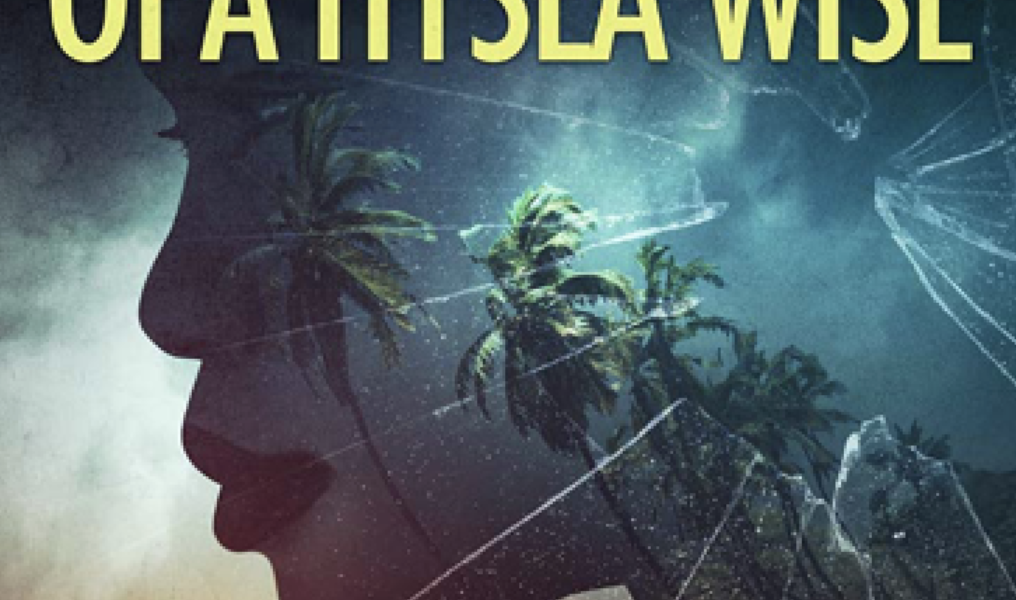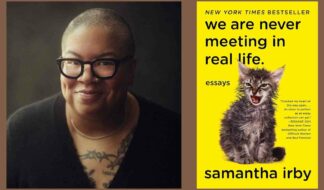Filled with many a guide for revolutionizing one's life, career or relationships, the self-help section is unmistakable in any bookstore. And while many of the books within that category contain valuable life lessons, it can be overwhelming for readers to decide which book will suit their needs best — especially when they're unfamiliar with what the genre has to offer. Author, motivational speaker and success coach Opa Hysea Wise decided to change that. After writing many a standard-format self-help book, she had the idea for something new: "No Place to Hide," a mystery thriller designed to administer the principles of self-help.
The story follows Smythe Windwalker Daniels, a woman who gets unexpectedly tangled up in a life-changing mystery. In addition to being an exciting piece of fiction, Hysea Wise used many elements from her own life, like her lesbian and mixed-race identities, to create Smythe's character. Hysea Wise made time for a phone call with Between The Lines to fill us in on what prompted "No Place to Hide," how readers can use Smythe's experiences as a tool in their own lives and why she hopes this book will inspire more authors to celebrate diversity in their writing.

Opa Hysea Wise. Courtesy photo.
What inspired you to write "No Place to Hide"?
I was inspired because I recognized that there were so many people in my life that don't read self-help books, and they need to (laughs). I think those same people will tell me that they read a lot of fiction, and it made sense to me — as I was going through a year-long program with Jack Canfield and having my own epiphanies and thinking, "Where has this information been?" — to create a story that would utilize some of what I've learned and actually used in my own practice to assist people that may not ever come across the information that I've come across.
What interested you first about self-help, and how did you get into motivational speaking?
I've been a trainer within government for many, many years and I decided, after I was laid off in 2012, to come out to Las Vegas to help my parents. Eventually, I saw myself so disheartened by what I was doing in my life that I decided to make a change. I was led to Jack Canfield, and I took a year-long program with him, and I also read anything and everything I could get my hands on. I got certified to coach a program, The Success Principles, and, from there, I've just been on my own helping people to reframe, if you will, their circumstances in life. One of the things that I've found is that people become so limited in their belief systems that they trap themselves in a cage and they reach out — usually at their wit's end — and we start unraveling and reframing their life so that they can begin to dream again and make the necessary steps to live a life that they want to.
If I'm not mistaken, Jack Canfield is famous in large part for creating the "Chicken Soup for the Soul" series.
Yes. I remember 20 years ago [I started reading them], and I told him this once, "I just couldn't get into your books" (laughs)! But I think I was at a place where I needed to shift myself, and that came up with "The Success Principles" and reading through it. I started thinking, "Yeah, this works. Why don't I know about this?" So, a lot of the clients that I come across — I've come across EMTs, I've come across grocery store workers, I have one that is a nurse — they are just profoundly unhappy in what it is they're doing. Many of them have dreams of either starting their own business or moving into a field, but what they tell themselves is that they can't do a thing because. That's where I usually start with them; it's their language, it's what are you telling yourself. You know, "can't," in and of itself, is a disempowering word. So I put them through activities. One would be, if you and I were having a conversation, I would say, "I can't touch a spider, Eve, what can't you do?" We'd go back and forth, and then we'd come back and say, using those same examples and change the word now to "I won't." So now, it's, "I won't touch a spider," and you say, "I won't" do something. Life has the power of choice. I will do a thing or I will not do a thing.
I was curious, do you think your background in diversity training aids your work now in self-help?
It is true. It's absolutely true. I'm always curious about the human condition, and I'm always scratching at it. And so, because I come from this place of compassion and values, I'm wanting for people to become the best version of themselves as they possibly can, and for them to identify that. So, yeah, when I'm looking at diversity education and I'm listening to a lot of hate speech, I begin to wonder about where did that come from. You were not born with that, and often, adult people forget that. We are not born to hate one another; it's a learned behavior. So, if I can help people to reframe, that's all I want to do, help people reframe who and what they think they are and help them to achieve whatever their dream is.
In my own reporting, I've certainly seen trauma negatively impact peoples' abilities to relate to other people who are not within the LGBTQ community.
Yeah, I grew up with a sense of otherness, being a mixed-race woman of color — both African American and Choctaw Native American. I'm also female, and I'm also a lesbian. I don't see a lot of me represented, even today, in mainstream media. And growing up, I certainly didn't see it. And so, it has colored the lens with which I look out into the world and it makes sense for me, as introverted as I truly, truly am, to stand up and begin to speak for people that may feel as though they are hiding in the margins. And to speak to what the issues are, especially with the LGBT community. One of my best friends is a pastor for the Metropolitan Community Church out here in Las Vegas and until COVID, we had weekly sit-down breakfasts that would last two, three and four hours kind of figuring out what the community needed and the type of representation. That's a big piece, right? We'd talk about the church or faith and our community and there's such a divide and a brokenness. I certainly felt it growing up. I thought, "Damn, I'm going to hell." Thankfully, that has shifted over time, and I write extensively about that.
So, it's no mistake then that the protagonist identifies with a lot of your identity traits, right?
I needed to create a character that I would want to read about, that represented who I was. I had this inspired thought, "Instead of writing another self-help book, why don't I write a book of fiction and utilize myself as an avatar and give my protagonist some of my characteristics." And I put her through it, if you will (laughs).
Have you written self-help fiction before, or was this your first time?
No, this is my first. And I didn't even know self-help fiction existed, all I knew was that I did not want to write another self-help book. I have at least 100 in my library, and they are a dime a dozen, and they say a lot of the same things, but they also lead us to this place where we think, "Well, how do we actually do this? How do I internalize what limiting beliefs are? How do I do X?" And I thought, "Let's just make this character ask these questions." And the hyperbole of the backstory of the murder that she witnesses and everything that she has to go through is really about life itself. Unexpected, crazy and outrageous things can happen, and it's our response that will determine the outcome. It will always be our response.
It seems like almost a character study of a self-help book being applied. Although, I'm sure it could be argued that some of the best fiction works could be treated as self-help tools.
Yeah! Have you ever read the book "The Alchemist"?
No, I haven't.
It's really good, and years ago, that sort of lit a fire under me, and a lot of [Paulo Coelho's] work has been duplicated, again in the self-help genre. There's so many cool life principles in there that it forces you to stop and think about that and think about how you could apply some of those principles into your own life.
If someone has never picked up a self-help book before but they're eager to do so, what would you tell them about your book?
I would say that my book can used as a tool that will allow the reader to examine their own life based on, perhaps some similarities that they share with Smythe — especially in her thinking. I allow the reader to actually read about her thinking. And the hope is that it will simply ignite in the reader a possibility that, "Yeah, maybe I could pick up a self-help book." Because Smythe talks about it and the books she's read. So, what I would love is for the reader of "No Place to Hide" to go, "Oh, let me go purchase that book." Also, Smythe has a secret. It's not until about ¬æ of the way through the book that you discover what it is she's hiding, and so many people today are hiding a part of themselves. My hope is that once the reader discovers the secret that one of two things will happen: they go, "Oh my God, this has actually happened to me!" Or, they go, "Oh my God, this is what's been driving her behavior." With either of those two responses, I hope it will drive them to seek healing if they need healing, their own healing. Because they're going to see, as a result of her exposing her secret, that she begins to shift, ultimately. If we could understand each others' stories — and we all have one — I think we might even be able to more accept one another perhaps proverbially wrap our arms around someone that we called an enemy.










